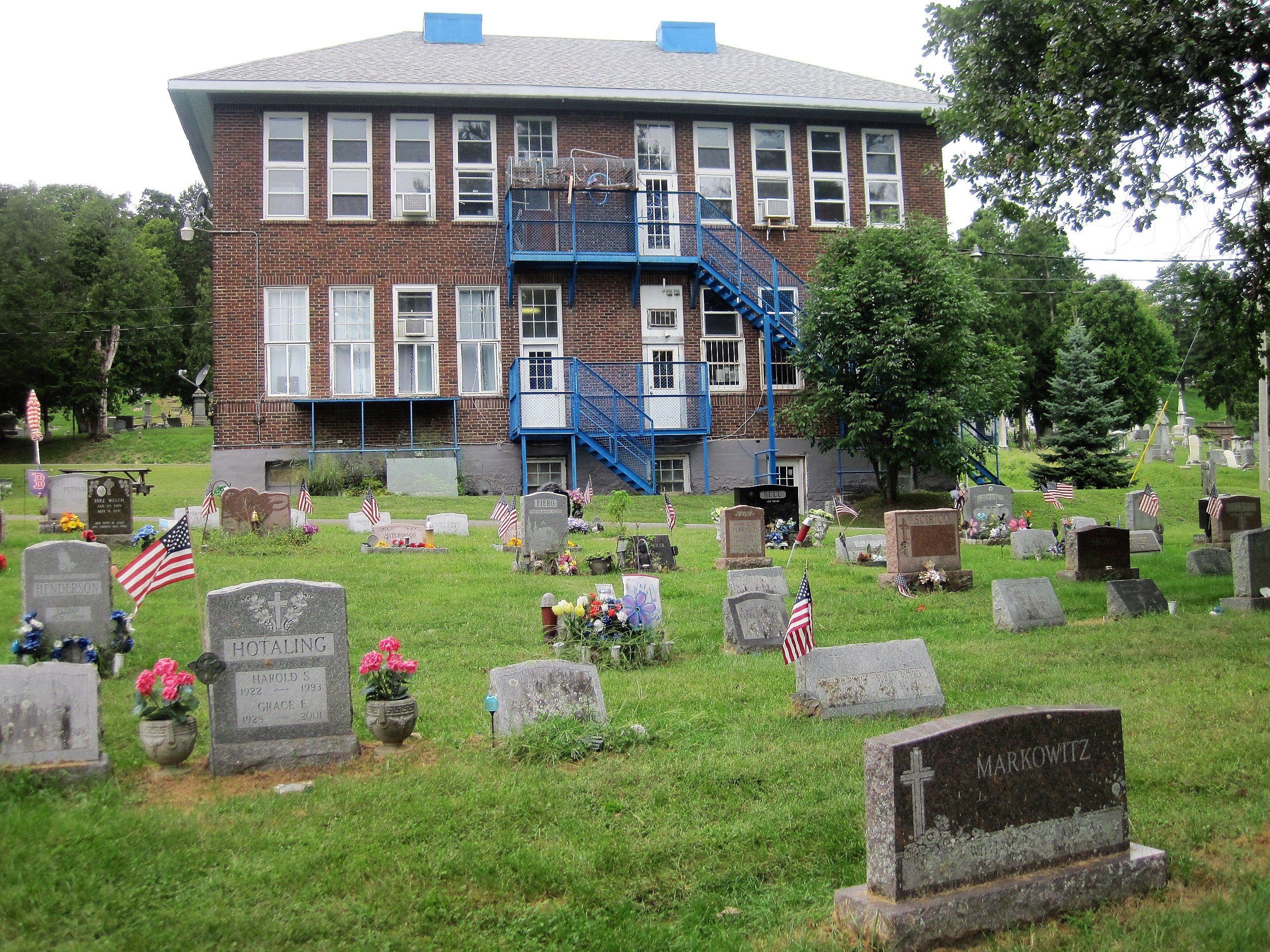
On Airbnb you can stay in a Mongolian yurt, on the side of a volcano, or in any number of houseboats, but there appears to be only one listing in a cemetery and over the weekend I decided to make a visit.
Laura Ann Jacobs greets me at the door in a dress the color of a tropical smoothie, a coconut white cockatoo named Tico on her shoulder, and ushers me into her home, which is located in a century-old schoolhouse in the upstate New York town of Hudson. The schoolhouse itself happens to be located smack in the middle of the town’s cemetery, which is set amidst rolling hills with towering pine trees, a perfect landscape for rambling. There are numerous well-weathered graves of people born before the United States was even called the United States. The Airbnb listing is “Cemetery Schoolhouse.”
“A lot of people don’t want to live in a cemetery,” says Laura Ann, as she leads me up the grand staircase to the main floor, “but they love visiting—and I get the best people in the world!”
She goes on to describe to me how her guests are very spiritual. They are often into healing arts and crystals and they appreciate, for example, the different potions she has set up in the hallway, the arthouse feel of the place, the cockatoo Tico. Guests also regularly observe spirits in walking through the cemetery to the downtown part of Hudson. “They are my people,” says Laura Ann—of the guests, not the spirits. She runs the Cemetery Schoolhouse with her partner Robert Pardo, an art dealer. It’s worth noting that every single one of the couple’s 200 plus reviews are five-star.
The kitchen has a towering ceiling, sweeping views of the neat and orderly new side of the cemetery, and a palatial cage for Tico. The stairwell, meanwhile, has sweeping views of the more rugged and windswept side of the cemetery. In the basement is a guestroom she has called “The Madhatter.” Laura Ann is an artist, she has been profiled in the New York Times, and this room, like all the guestrooms in the home, features her own artwork, a blend of Magical Mystery and Alice in Wonderland.
There is also a very special room with a massive metal door adorned with a lion’s head, as if out of a medieval castle. A key stuck in the door invites guests to turn it. When they do the door opens automatically into a plush sofa-lined sanctuary that used to be the coal room in the old schoolhouse. “I got rid of all the cobwebs and dead rat skeletons,” says Laura Ann, beaming.
“Are there ghosts?” I ask.
Apparently not. “Nobody died in this building,” says Laura Ann. “No one had terrible things happen to them in this building.” By that, I take it to mean that the former schoolchildren were happy, and the ghosts in the cemetery outside are good ghosts—or at least, they keep their distance and respect Laura Ann and her Cemetery Schoolhouse.
There is nothing morbid about Laura Ann, in fact, she is bursting with life—the New York Times article described her as “so kinetic she thrums like a violin string.” Yet she explains that as a child she used to imagine what words would be on her tombstone. Although now she is not sure she would even want one at all. “If everyone became a tree,” she exclaims, “that would be the best idea, can you imagine if every single one of these graves became a tree.”
Laura Ann may be the only Airbnb cemetery hostess, but Digital Dying has interviewed other cemetery dwellers. “People seem to be somewhat afraid of death,” Helen Sclair told us back in 2009. “But if you look closely you’d be amazed at what you’ll find in cemeteries. You step back in time and you cross oceans.”
At the time Helen was 78 and lived in a cottage on the grounds of Bohemian National Cemetery, in Chicago. Known locally as the Cemetery Lady, Helen really took the aesthetic to the next level. She had a copper-lined burial vault in her living room, and her dining room was filled with coffins, including one from the 1940s fit for a baby, a wicker model from the 1920s and a Civil War-era pine casket. On her walls were the death mask from a notorious Depression-era Chicago bank robber and paraphernalia from Day of the Dead and Qingming, Mexican and Chinese festivals that involve decorating ancestral graves.
Helen found her way to Bohemian after taking a bad fall. Her daughter suggested moving to a one floor home or an elevator building. Helen scoffed at the idea, and instead, called the Bohemian National Cemetery and asked for a home. After a nod from the board of directors, she was allowed to move into one of three simple cottages on the property. “It’s been wonderful,” Helen said, “I live with death on a daily basis.”
And in our buzzing modern world, where even small towns like Hudson are under the grips of gentrification and real estate values have skyrocketed across the nation, making it difficult for artists to find permanent homes, the dead can indeed make fine neighbors. Fancy new glass condos can’t go up in a cemetery, and your neighbors are never going to be richer than you. Living in a cemetery is, essentially, a fine way to escape the sweep of gentrification. Which is exactly how Laura Ann sees it.
“This place is going to stay,” she says. “They’re not going to build any high rises here, so I am safe. This place is going to stay beautiful forever.”
We stand in the doorway and say goodbye. Up through the graves and under the towering pines I spot deer grazing. Laura Ann says she sees them all the time.
“I hope this will become a destination place,” she adds. “It’s one of the unique things about Hudson.”









